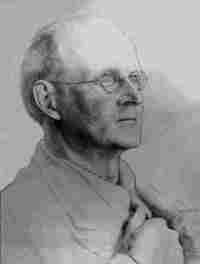Charles Kay Ogden facts for kids
Quick facts for kids
Charles Kay Ogden
|
|
|---|---|
 |
|
| Born | 1 June 1889 Fleetwood, Lancashire, England
|
| Died | 20 March 1957 (aged 67) London, England
|
| Alma mater | Magdalene College, Cambridge (MA) |
| Era | Contemporary philosophy |
| Region | Western philosophy |
| School | British pragmatism |
|
Main interests
|
Philosophy of language |
|
Notable ideas
|
Semantic triangle, Basic English |
|
Influences
|
|
|
Influenced
|
|
Charles Kay Ogden (1 June 1889 – 20 March 1957) was an English linguist, philosopher, and writer. He was known for being very smart and interested in many different subjects. He worked on many projects related to literature, politics, art, and philosophy. He was especially important as an editor, translator, and someone who pushed for changes to the English language. Today, he is mostly remembered for creating and promoting Basic English.
Contents
Early Life and Education
Charles Kay Ogden was born in Fleetwood, Lancashire, England, on June 1, 1889. His father worked at Rossall School.
Charles went to school at Buxton and Rossall. He earned a scholarship to Magdalene College, Cambridge, where he started studying Classics in 1908.
He traveled to Europe in 1912 and 1913 to learn about different ways of teaching languages. He earned his Master of Arts (M.A.) degree in 1915.
Career Highlights
The Heretics Society
In 1909, while still a student, Ogden helped start the Heretics Society in Cambridge. This group liked to question old ideas and religious beliefs. It began with 12 students who were interested in new ways of thinking.
The Society welcomed everyone, including women. Famous speakers like Jane Ellen Harrison and J. M. E. McTaggart gave talks there. They encouraged people to think for themselves and not just follow the crowd.
Ogden was the President of the Heretics for over ten years, starting in 1911. He invited many important people to speak. For example, in 1911, G. K. Chesterton gave a talk about "The Future of Religion." In 1923, the biologist J.B.S. Haldane spoke about "Science and the Future." Later, in 1924, Virginia Woolf used the Society to discuss her ideas about writing. In 1929, the famous philosopher Ludwig Wittgenstein also gave a lecture on ethics at Ogden's invitation.
Cambridge Magazine
In 1912, Ogden started the weekly Cambridge Magazine, and he was its editor until 1922. He continued to edit the magazine during World War I. He couldn't join the military because of a childhood illness.
The magazine published writings by famous authors like Siegfried Sassoon, Thomas Hardy, and George Bernard Shaw.
During the war, the magazine became known for its international news. It had a special section called Notes from the foreign press, which translated articles from many foreign newspapers. This section was very important because it gave British readers a look at what other countries were saying about the war. It became very popular, with over 20,000 copies sold.
Because of its neutral reporting, the Magazine faced criticism during the war. Some people thought it was too peaceful, especially those who strongly supported the war. However, others defended it, saying it was important for people to read different viewpoints.
The Cambridge Magazine continued after the war but eventually stopped publishing in 1922.
Author, Bookseller, and Editor
Ogden wrote four books during World War I. He also translated a book about industrial training.
He owned two bookshops in Cambridge and an art gallery. In his gallery, he sold art from the Bloomsbury Group, a famous group of English writers, intellectuals, philosophers and artists.
Ogden also became an important editor for Kegan Paul, a publishing company in London. In 1920, he helped start the psychology journal Psyche, and he later became its editor. This journal was a way for him to share his interests.
For Kegan Paul, he also created and edited five different series of books. These included "The History of Civilization" and "The International Library of Psychology, Philosophy and Scientific Method." These series published hundreds of books on many different topics. He also edited the "To-day and To-morrow" series, which featured popular essays with interesting titles.
Language and Philosophy
Ogden helped with the English translation of Ludwig Wittgenstein's important book, Tractatus Logico-Philosophicus. The actual translation was done by F. P. Ramsey.
Ogden's most famous written work is his book (with I. A. Richards) called The Meaning of Meaning (1923). This book explored how language works and how we understand words. It introduced the idea of the semantic triangle, which helps explain the relationship between a word, our thoughts about it, and the actual thing it refers to. The book also included the famous phrase: "The gostak distims the doshes," which shows how we can understand grammar even if the words are made up.
Advocacy for Basic English
From 1925 until he died in 1957, Ogden spent most of his time promoting Basic English. Basic English is a simplified version of the English language. It uses only 850 words and a few simple rules. These 850 words are designed to do the job of about 20,000 regular English words. Ogden believed this simplified language could help people from different countries communicate more easily.
To promote Basic English, Ogden started the Orthological Institute in 1927. The word "orthology" means the study of correct language. The Institute worked to spread the idea of Basic English around the world.
In 1929, the Orthological Institute even published a recording of James Joyce reading from his famous book Finnegans Wake. Later, Ogden translated a part of Finnegans Wake into Basic English.
Personal Life
Charles Ogden collected a huge number of books. After he died, his collection of very old books, manuscripts, and papers was bought by University College London. The rest of his enormous personal library was bought by the University of California - Los Angeles.
Ogden died in London on March 20, 1957.
Legacy
Even though he wasn't a university professor, Ogden had a big impact on British philosophy. His book The Meaning of Meaning helped develop the idea of emotivism, which suggests that moral statements express feelings rather than facts.
He also edited a work by Jeremy Bentham and translated a book by Hans Vaihinger. These works are seen as early ideas for fictionalism, which explores how we use made-up ideas or stories to understand the world.
In 1973, a book was published called Letters to C.K. Ogden with Comments on the English Translation of the Tractatus Logico-Philosophicus. It included letters between Ogden and Ludwig Wittgenstein about the translation of Wittgenstein's important philosophical work.
See also
 In Spanish: Charles Kay Ogden para niños
In Spanish: Charles Kay Ogden para niños
- Simple English
- Universal language
 | Madam C. J. Walker |
 | Janet Emerson Bashen |
 | Annie Turnbo Malone |
 | Maggie L. Walker |


